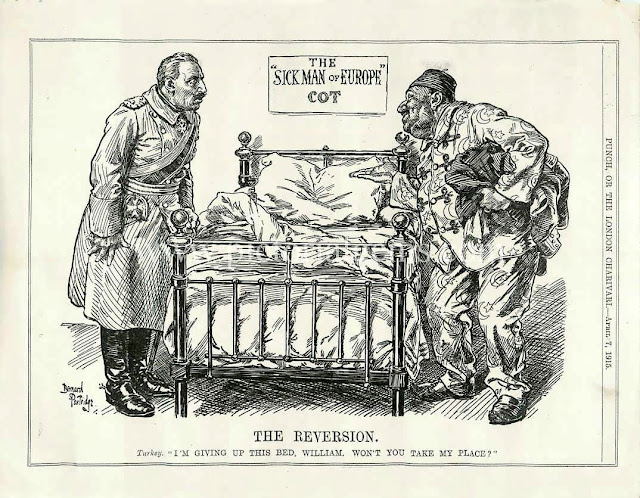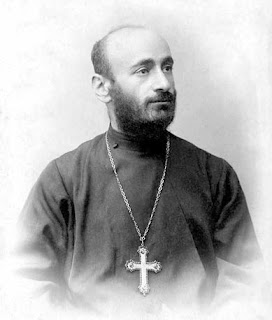Ottoman Empire was at his death bed at the turn of the 20th century. Only thing that kept the European states from killing "The sick man of Europe" (coined by Czar Nicholas I during a conversation with the British ambassador) was the delicate balance of power between them, and the Ottomans playing to the enviness of the parties that have interest in the region.
 |
| The sick man of Europe |
In 1908 Young Turks seized power in the capital after a coup d'etait against Abdulhamid II introducing multi party politics. Within a year a counter coup in the name of the rule of the sultan was put into action but was quelled by the army. Balkan Wars (1912-1913) ensued with a major blow to the Empire by what was once one of their vassals. Loss of Thessaloniki did hurt deeply especially.
 |
| Card celebrating 1908 coup and return to constitutional monarchy |
The Turkish desire to regain land lost were best accompanied by an agressive
German Empire whose ties with the Ottomans were getting stronger at the start of the 20th century as they had invested in infrastructure and training and re-equipment of the army. Pro-German faction of Enver ruled over a pro-British majority. On July 30 1914 a secret Ottoman-German alliance against Russia was signed. Later on Germans replaced the ships the British were meant to deliver to Istanbul which they seized apparently out of necessity or perhaps a lack of trust to the Turkish government.
 |
| Yavuz Sultan Selim and Midilli in the Bosphorus by Ian Marshall, the replacements sent by the Germans |
Ottomans under the influence of the bright achievements of their German counterparts and their show of solidarity entered the war on the side of the Central Powers.
A former plan to knock Turkey out was made by Lord Kitchener. It was to land at Alexandretta (modern Turkey, İskenderun) the strategic center of the Empire's railway and to start an Arab revolt to block the Turks harassing the Suez Canal. The plan was abandoned partly because of its location in the French sphere of influence.
The route to Russia was cut off completely with the start of the war by land as the central powers Germany and Austria, by sea a Baltic blockade by the German navy and the Dardanelles under Ottoman control. There was a route running around the globe to reach the Russian east, but the sea route was covered by ice and it was too far away from the action. Churcill offered to clear the Dardanelles and capture Istanbul with obsolete battleships that could not fight the German Navy.
 |
| The outlook of Europe at the start of the World War I |
The Gallipoli Campaign started on 25th of February 1915 with the naval bombardment of outer forts and the Royal Marines landed on both sides of the strait to destroy the guns. On March 18, a major naval push through the straits was repelled primarily by mines and the artillery fire from the land prompting the Allies to prepare for an amphibious landing. The Turks rallied their forces for a final surge in defence of motherland made the Allies retreat after 8 months.
 |
| Map of Gallipoli |
Ottoman Turkey joined the war to live again the imperial glory but things went from bad to worse when the sick man of Europe found himself with a knife on his throat in the Dardanelles. Mustafa Kemal proved himself to be a worthy commander at the land campaign and the defeat at Gallipolli gave birth to a national consciousness for the Australians and New Zelanders after the war.






Comments
Post a Comment